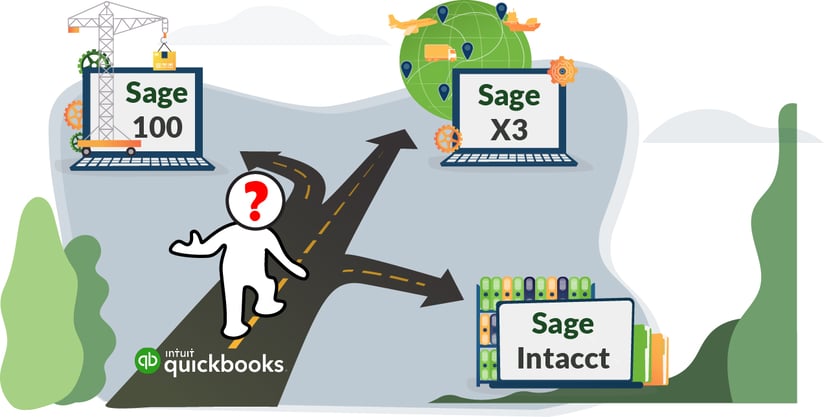QuickBooks by Intuit is a terrific solution for start-ups and small corporations with few employees, light transaction volume, and simple transactions. Its affordability and easy design keeps initial costs low and promotes rapid deployment. Primarily an accounting solution, QuickBooks relies on its vast Apps Store, a marketplace of third party add-ons, to extend QuickBooks beyond its core features.
But how do you know when you’ve outgrown QuickBooks? Typical signs of stress include multiple Apps Store add-ons that overlap threatening compatibility and performance, manual processes in Excel or Google Sheets as workarounds for functional gaps, and allowing QuickBooks functionality to control how you do business. By design, QuickBooks is not scaled to grow with clients beyond start-ups and small enterprises. So now what?
Sage 100 and Sage X3 vs QuickBooks
The Solutions for Growing Distributors and Manufacturers
QuickBooks core audience is small businesses with simple accounting requirements focused primarily on the organizations’ finance needs, but its basic Inventory functionality works well for companies using average cost method with few SKUs including inventory, non-inventory, and service items. An upgraded version, QuickBooks Enterprise, delivers Advanced Inventory capabilities for warehousing and sales order management. Fishbowl Inventory and Fishbowl Manufacturing are the most common add-ons that we encounter for companies looking to extend QuickBooks capabilities through inventory planning and manufacturing production. Both are easy to use, easy to implement, and automatically sync your data with QuickBooks. The downside of Fishbowl is that you’re stuck with the average cost method because it does not support LIFO, FIFO or others. Fishbowl also has reporting and customization limitations that require significant programming experience to utilize. Finally, shipping and logistics functions are buggy and fall short of minimum requirements for most companies.
But why is Sage an option for customers that have outgrown QuickBooks? Unlike Intuit, which focuses on start-ups and small companies with QuickBooks, Sage focuses on emerging small and medium sized business (SMB). By definition, the SMB market is attributed to companies with less than 100 employees and $50M revenue. However, the traditional definition of SMB ignores factors like growth, operational complexity, and the volume of data.
For small and medium size businesses, Sage specializes in midmarket solutions for growing companies beyond start up enterprise status; Sage 100 and Sage X3. Both solutions are grounded in strong inventory management, sales order fulfillment and industry-specific manufacturing capabilities. The Sage solutions offer transactional flexibility, configurable business rules, and scalable infrastructure for growth of master data and transactional volumes. Which Sage product is right for you?
Learn More:
Sage Intacct vs QuickBooks
The Solution for Everything Else
If inventory requirements are basic or irrelevant, then Sage Intacct is an excellent choice for companies that have outgrown QuickBooks. Sage Intacct is a powerful best-in-class accounting solution that ensures transactional and data integrity to simplify audits while providing reliable access to data and analytics for real-time decision-making. Sage Intacct is the first and only accounting solution endorsed by the AICPA, a national organization of professional Certified Public Accountants. Sage Intacct delivers accounting functionality purpose-built for Nonprofits, Entertainment, Senior Living & Residential Care facilities, Healthcare Providers, Software Publishers, Professional Services and Finance industries.
Learn More:
- Sage Intacct - Newest Modules and Features
- How Much Does Sage Intacct Cost?
- Watch a Sage Intacct Demo
About the Publishers
Sage (The Sage Group, plc) is a publicly-held company currently traded on the FTSE 100 and has posted steady, predictable growth year-after-year since 1989. Sage revenue is $2.2 billion with more than 6 million customers worldwide. Visit the Sage Investors page for more information about financial and stock performance.
Founded in 1983 with Quicken, Intuit is headquartered in Mountain View, CA. Intuit’s flagship products are QuickBooks, TurboTax, Quicken and Mint. Intuit QuickBooks is stated to have approximately 29 million business installs in the US however Intuit does not disclose their install base by product. It’s estimated that Intuit has less than 6 million users worldwide across all products including non-ERP and overall annual revenue exceeding $4 billion.




